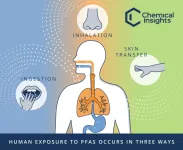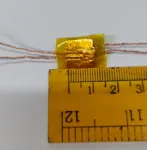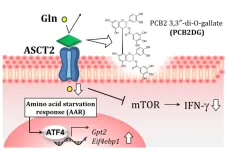(Press-News.org) Bethesda, MD (Feb. 21, 2023) — In new evidence-based guidelines, the American Gastroenterological Association (AGA) recommends non-invasive biomarkers as a first-line strategy for monitoring many patients with ulcerative colitis (UC). These guidelines were published today in Gastroenterology.
The AGA guidelines outline use cases for three biomarkers that provide accurate insights into ulcerative colitis disease activity: serum C-reactive protein (CRP) (blood), fecal calprotectin (stool) and fecal lactoferrin (stool).
“For decades we have regarded endoscopy as the gold standard for monitoring ulcerative colitis and detecting bowel inflammation, but repeated endoscopic assessment is invasive, expensive and often impractical,” says guideline author Siddarth Singh, MD, MS, University of California, San Diego. “Not only are biomarkers accurate, but they provide patients with a cheaper and more convenient option of monitoring to ensure medications are working and ultimately keeping their disease well-managed.”
AGA recommends a monitoring strategy that integrates non-invasive biomarkers for patients with ulcerative colitis in remission (no current symptoms) as well as those with current symptoms.
Patients with ulcerative colitis in symptomatic remission:
Perform interval biomarker monitoring every six to 12 months.
AGA recommends stool-based biomarkers over blood testing.
If biomarkers are normal, AGA suggests continuing biomarker monitoring and avoiding routine endoscopic assessment.
If biomarkers are elevated, AGA suggests endoscopic assessment by a gastroenterologist.
Listen to your body! Talk to your doctor about any new symptoms.
Patients with symptomatically active ulcerative colitis:
Biomarker testing should be the first step to determine the need for endoscopic assessment.
For patients with mild symptoms who have normal or elevated biomarkers, AGA suggests endoscopic assessment by a gastroenterologist.
For patients with moderate to severe symptoms who have normal biomarkers, AGA suggests endoscopic assessment by a gastroenterologist.
For patients with moderate to severe symptoms and elevated biomarkers, AGA suggests treatment adjustment and avoiding endoscopic assessment.
With AGA guidelines guiding the use of noninvasive biomarkers, physicians can confidently offer a more convenient and closer monitoring option for their patients.
“Currently biomarkers are considered experimental by insurers,” adds guideline author Ashwin N. Ananthakrishnan, MBBS, MPH, Massachusetts General Hospital. “This guideline is a major step in showing the value of noninvasive biomarkers and the importance of insurers covering biomarker monitoring to improve patient satisfaction and clinical outcomes.”
AGA will advocate for all insurers to cover the cost of biomarker testing in ulcerative colitis.
About ulcerative colitis
Ulcerative colitis is one of the two main types of inflammatory bowel diseases and is more common than Crohn’s disease. It causes inflammation (swelling) and sores (called ulcers) in the large intestine (colon and rectum) and may affect part or all the large intestines. Ulcerative colitis can happen at any age, but it is more likely to develop in people between the ages of 15 and 30, or older than 60 years of age. Learn more in the AGA GI Patient Center.
Resources
Biomarkers in ulcerative colitis guideline
Spotlight (one-page infographic)
Clinical decision support tool
# # #
Media contact: Courtney Reed, media@gastro.org, 301-272-0025
About the AGA Institute
The American Gastroenterological Association is the trusted voice of the GI community. Founded in 1897, the AGA has grown to more than 16,000 members from around the globe who are involved in all aspects of the science, practice and advancement of gastroenterology. The AGA Institute administers the practice, research and educational programs of the organization. www.gastro.org.
AGA is now on Instagram.
Like AGA on Facebook.
Follow us on Twitter @AmerGastroAssn.
Check out our videos on YouTube.
Follow AGA on LinkedIn.
About Gastroenterology
Gastroenterology is the most prominent journal in the field of gastrointestinal disease. As the official journal of the AGA Institute, Gastroenterology delivers up-to-date and authoritative coverage of both basic and clinical gastroenterology. Regular features include articles by leading authorities and reports on the latest treatments for diseases. Original research is organized by clinical and basic-translational content, as well as by alimentary tract, liver, pancreas, and biliary content. www.gastrojournal.org/
END
New AGA guideline recommends blood and stool tests for monitoring ulcerative colitis
Insurers should note: Non-invasive biomarkers are more cost-efficient than endoscopy for many UC patients
2023-02-21
ELSE PRESS RELEASES FROM THIS DATE:
RIT researcher awarded NSF CAREER funding to develop advanced computer memory and devices
2023-02-21
Kai Ni was awarded a National Science Foundation CAREER Award to improve computing memory through the use of ferroelectric materials and capacity.
The assistant professor of electrical and microelectronic engineering in RIT’s Kate Gleason College of Engineering, Ni has been at the forefront of advancing ferroelectric memory, a familiar but never widely adopted technology that has the potential to meet the growing demand for more energy-efficient computing performance.
“The appetite for semiconductors just keeps growing. With the data we are generating every day, we need ways to process ...
CHOP researchers develop first effective preclinical models for most common genetic cause of Leigh Syndrome
2023-02-21
Philadelphia, February 21, 2023 – Researchers from Children’s Hospital of Philadelphia (CHOP) developed two new zebrafish models for studying a specific genetic form of mitochondrial disease that represents the most common cause of Leigh syndrome. Using these models, the team identified two drugs already approved by the Food and Drug Administration (FDA) for other conditions that could be repurposed to treat this specific cause of Leigh syndrome. The findings were recently published in the journal Human Molecular Genetics.
SURF1 deficiency ...
Public lecture: how can we have a good future with artificial intelligence?
2023-02-21
Public lecture: how can we have a good future with artificial intelligence?AI expert and educator Professor Anikó Ekárt to discuss one of today’s most provocative topics
Lecture will take place on 28 February at Aston University
Talk to explore artificial intelligence’s capabilities, benefits and pitfalls.
The potential impact of artificial intelligence (AI) on our daily lives will be explored in a public lecture at Aston University.
The University is inviting the public onto its campus on Tuesday 28 February to hear Professor ...
Study finds parents serve as a safety net as grown kids navigate the workforce
2023-02-21
A new study underscores the role that parents play as a safety net for their young adult children as those children navigate the labor market, and highlights the challenges facing young adults who do not have access to parental support.
“In recent decades, we’ve seen a lot of changes in the labor market, from the decline of lifetime employment at one job to the rise of the so-called ‘gig economy,’” says Anna Manzoni, corresponding author of the study and an associate professor of sociology at North Carolina State University. “We wanted to see what role ...
Noble false widow spider found preying on pygmy shrew
2023-02-21
Scientists at University of Galway have published the first record of a noble false widow spider feeding on a pygmy shrew, a species of tiny mammal protected in Ireland.
The new study, recently published in the international journal Ecosphere, demonstrates further the potentially negative impact of the invasive and venomous noble false widow spider on native species.
A recording by Dawn Sturgess showing the spider interacting with the pygmy shrew be downloaded at https://bit.ly/3XPbDKU.
It is the first time a member of this family of spiders, ...
Starch gelatinization, retrogradation, and the world’s fluffiest white bread (video)
2023-02-21
WASHINGTON, Feb. 21, 2023 — If you want to make the fluffiest bread possible, you’re going to need to use chemistry. This week, we explore the science behind starch gelatinization, a phenomenon found in Chinese “tangzhong” and Japanese “yudane” techniques. Then, we put it to the test to see how much gelatinized starch it takes to make the fluffiest, tastiest and most stale-resistant loaf! https://youtu.be/3ziMBDPMuP8
Reactions is a video series produced by the American Chemical Society and PBS Digital Studios. Subscribe to ...
Chemical Insights Research Institute and Emory University’s Rollins School of Public Health team to study the human health impact of PFAS chemical exposure
2023-02-21
ATLANTA – Feb. 21, 2023 – Chemical Insights Research Institute (CIRI) of UL Research Institutes and Emory University's Rollins School of Public Health have announced upcoming research to study human exposure to per- and polyfluoroalkyl substances (PFAS). Data from the Centers for Disease Control and Prevention (CDC) show that approximately 97% of Americans have detectable PFAS levels in their blood. The joint study aims to understand how this exposure occurs and the potential health consequences.
Although humans may be exposed to PFAS by ingesting food or ...
These sports sensors could curb ‘bad calls’ and help players during practices
2023-02-21
If you watched the most recent Super Bowl, you know the importance of a referee’s call on the outcome of a game. Slow-motion replays and close-watching eyes help, but a new sensor technology could someday serve as an even more reliable tool for officials. Researchers reporting in ACS Applied Nano Materials have developed a self-powered, hybrid nanogenerator sensor that could help make more accurate calls and allow boxers and cricket players to practice more efficiently.
As sensors become less complicated and more ubiquitous, their applications have stretched into the world of sports, ...
Black patients more prone to dialysis graft failure
2023-02-21
OAK BROOK, Ill. – Compared to other races, African American patients are more likely to experience premature arteriovenous (AV) graft failure in the treatment of advanced kidney failure, according to a study published today in Radiology, a journal of the Radiological Society of North America (RSNA).
Chronic kidney disease affects roughly 37 million U.S. adults, according to the Centers for Disease Control and Prevention. Over time, chronic kidney disease can result in kidney failure.
One treatment option for advanced kidney failure is hemodialysis, or dialysis, ...
Polyphenols may be missing component in regulating inflammatory immune responses
2023-02-21
PCB2DG, a polyphenol with anti-inflammatory properties, works by targeting and directly interacting with the major glutamine transporter protein, alanine serine cysteine transporter 2 (ASCT2), to inhibit the uptake of glutamine, an important amino acid found in the blood. This reduction of intracellular glutamine accumulation in CD4+ T cells also reduces the production of interferon-gamma, or IFN-γ showing promise in the future of dietary polyphenol treatment for those suffering from autoimmune diseases. Additionally, the identification of ASCT2 as the target protein of PCB2DG is one ...
LAST 30 PRESS RELEASES:
Molecular glue discovery: large scale instead of lucky strike
Insulin resistance predictor highlights cancer connection
Explaining next-generation solar cells
Slippery ions create a smoother path to blue energy
Magnetic resonance imaging opens the door to better treatments for underdiagnosed atypical Parkinsonisms
National poll finds gaps in community preparedness for teen cardiac emergencies
One strategy to block both drug-resistant bacteria and influenza: new broad-spectrum infection prevention approach validated
Survey: 3 in 4 skip physical therapy homework, stunting progress
College students who spend hours on social media are more likely to be lonely – national US study
Evidence behind intermittent fasting for weight loss fails to match hype
How AI tools like DeepSeek are transforming emotional and mental health care of Chinese youth
Study finds link between sugary drinks and anxiety in young people
Scientists show how to predict world’s deadly scorpion hotspots
ASU researchers to lead AAAS panel on water insecurity in the United States
ASU professor Anne Stone to present at AAAS Conference in Phoenix on ancient origins of modern disease
Proposals for exploring viruses and skin as the next experimental quantum frontiers share US$30,000 science award
ASU researchers showcase scalable tech solutions for older adults living alone with cognitive decline at AAAS 2026
Scientists identify smooth regional trends in fruit fly survival strategies
Antipathy toward snakes? Your parents likely talked you into that at an early age
Sylvester Cancer Tip Sheet for Feb. 2026
Online exposure to medical misinformation concentrated among older adults
Telehealth improves access to genetic services for adult survivors of childhood cancers
Outdated mortality benchmarks risk missing early signs of famine and delay recognizing mass starvation
Newly discovered bacterium converts carbon dioxide into chemicals using electricity
Flipping and reversing mini-proteins could improve disease treatment
Scientists reveal major hidden source of atmospheric nitrogen pollution in fragile lake basin
Biochar emerges as a powerful tool for soil carbon neutrality and climate mitigation
Tiny cell messengers show big promise for safer protein and gene delivery
AMS releases statement regarding the decision to rescind EPA’s 2009 Endangerment Finding
Parents’ alcohol and drug use influences their children’s consumption, research shows
[Press-News.org] New AGA guideline recommends blood and stool tests for monitoring ulcerative colitisInsurers should note: Non-invasive biomarkers are more cost-efficient than endoscopy for many UC patients





